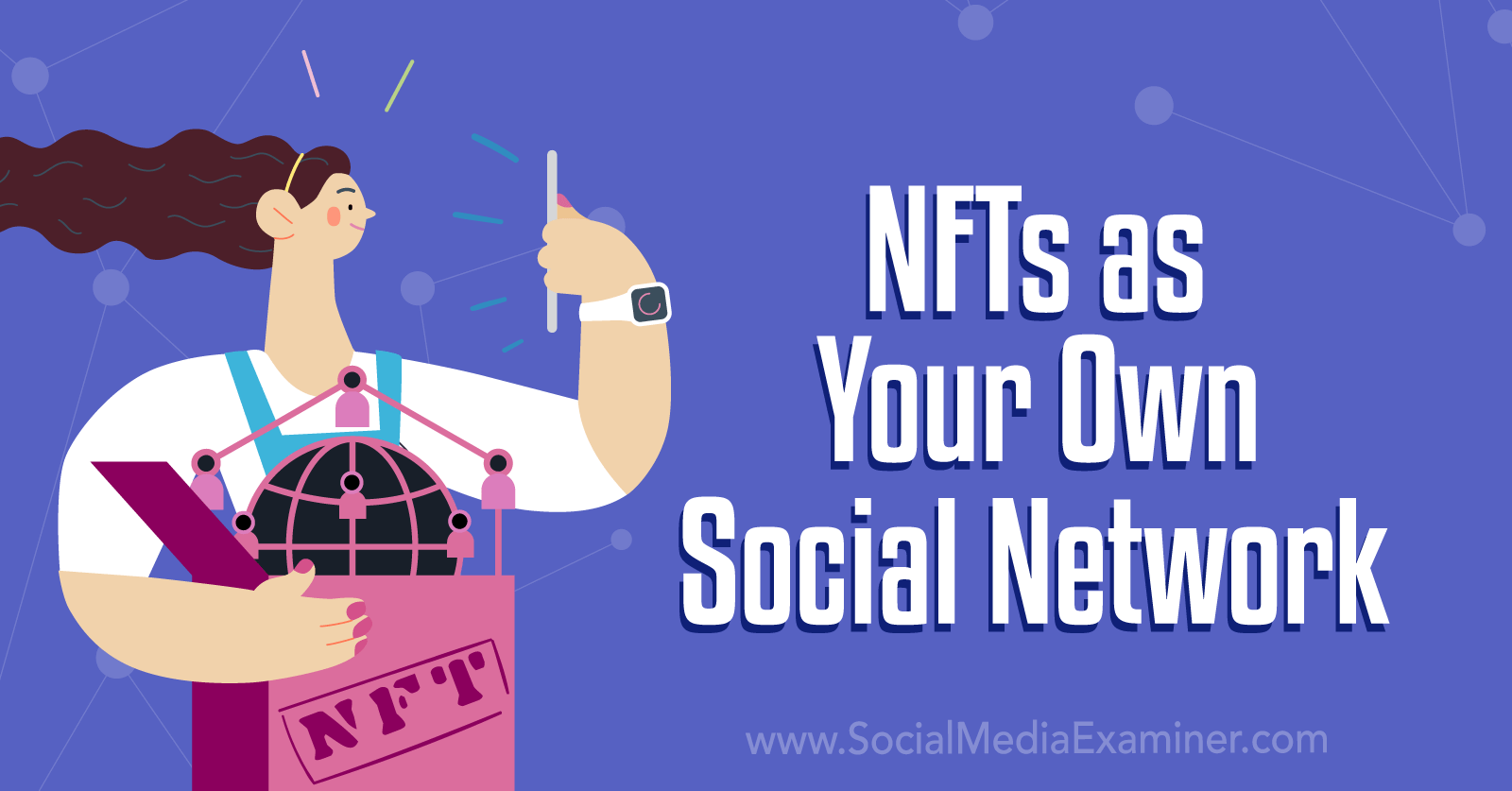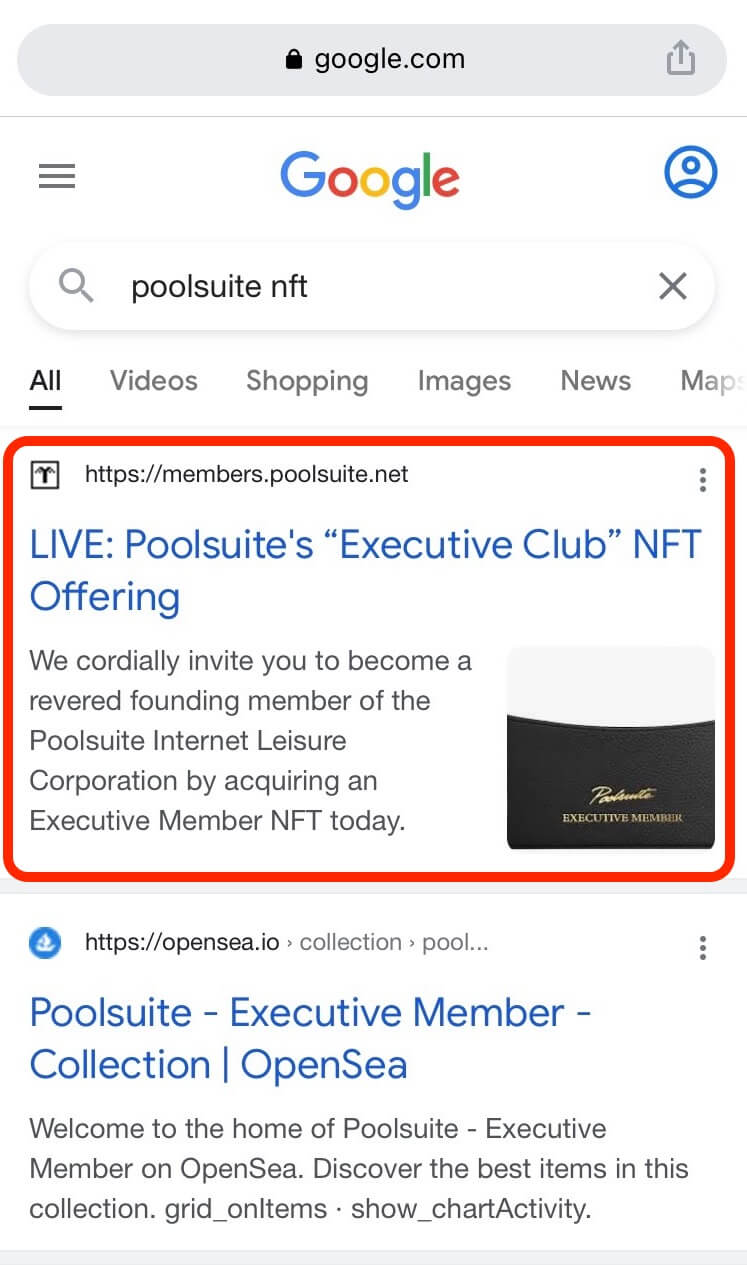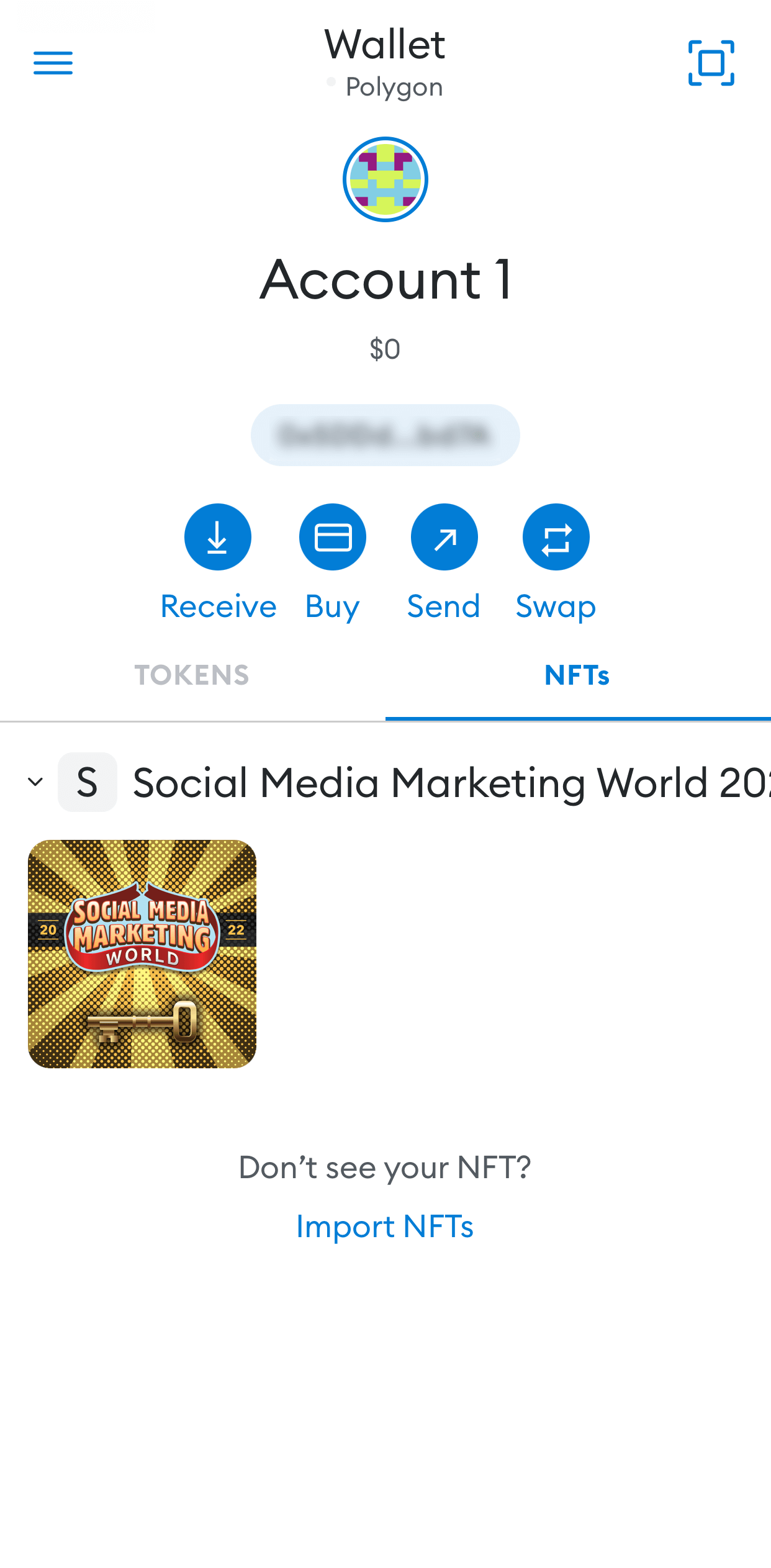Curious about NFTs? Not sure how they apply to social media marketing?
In this article, you'll discover how using NFTs is similar to creating your own social network and why NFTs might make sense for your business right now.

How NFTs Capture the Monetary Value of a Community
Let's start by talking about why your business should even be considering NFTs. The short answer is that NFTs give you the most direct connection you can have with your audience or customer base without any of the middlemen, borrowed platforms, and third-party handlers getting in the way.
Additionally, NFTs help capture the value of that relationship with your audience. Let's face it… what's a business without its customers? And what do the customers have without the business? The value of that relationship grows because of the synergy created by you and your audience—and before NFTs, there was no way to tie a dollar amount to that value.
The world of crypto introduces the concept of “user-generated capital.” What that means is when you launch an NFT collection for your business, you can identify the people who own a piece of that collection and then proceed to provide a lot of value to them. If you can do that in a collaborative way with your audience, you unlock user-generated capital, meaning the value of the community will be represented by the pricing of those NFTs.
There are also the more expected benefits to businesses looking to start NFTs as their social communities. The ability of NFTs to generate revenue for your business, unlock experiences for your audience, and give ownership to members of the community are all huge benefits for both you and your audience.
Effectively, we've always known that certain social circles or clubs hold more value for their members because of the members in those clubs. Because of the connections, contents, access, or even tools, businesses are able to unlock that value and sell access or ownership of that access to the community. It's in that way that the market basically discovers the price and the business while the customers unlock the social capital behind it.
How NFTs Auto-Manage Access to a Social Network
NFTs serve as a kind of social graph. In other words, they provide a layer of data points on how people are connected. For example, if two fans of generative art each collect a piece from the same artist, then they're connected on that artist's social graph. They're connected because these NFTs sit on a ledger (which is basically a database).
So how do you unlock the communication layer of people who hold those NFTs?

You can foster these connections through token-gated communities on a platform like Discord. Access to these communities is essentially tied to NFTs.
The way it works is people connect their wallet to the Discord server, a bot reads their wallet to ensure that they have the right NFT(s) in their wallet, and then it allows them access to that community or premium spot within the community. And then just like that, almost instantly, the social graph comes to life and the people are connected.
If you've done a deep dive into crypto, Web3, and NFTs, then you'll no doubt have heard about projects being designed to create the social media blockchain. However, there's reason to believe that the decentralized social network is already here and it's on Ethereum.

First of all, one sign of an industry or technology disruption is when one entity, such as a new product or company, sort of gobbles up the old industry in its entirety all at once.
For example, when Amazon introduced Prime along with 2-day shipping, they gobbled up shipping as a separate industry and turned it into a feature of their Prime membership. When they released Prime video, they gobbled up the cable industry and made it a feature of their Prime membership. In much the same way, Ethereum is gobbling up social media and making it a feature of the blockchain.
Get World-Class Marketing Training — All Year Long!
Are you facing doubt, uncertainty, or overwhelm? The Social Media Marketing Society can help.
Each month, you’ll receive training from trusted marketing experts, covering everything from AI to organic social marketing. When you join, you’ll also get immediate access to:
- A library of 100+ marketing trainings
- A community of like-minded marketers
- Monthly online community meetups
- Relevant news and trends updates
So how does the blockchain enable social communities? This is where those token-gated communities come into play. Discord is where much of this is taking place right now but other platforms are being developed all the time. Whichever technology you choose to build your community on doesn't really matter. You could technically port your community from one platform to another because the key to everything is the NFT.
One of the truly brilliant pieces of building a community this way is that there's less friction for the audience. There are no more individual accounts on every website, each with a different username or password to remember. The identity and access are all controlled by the connected wallet.
Additionally, membership of that access can be transferred. If one person purchases a membership and then later decides to leave that community, they can sell their membership to someone else, thereby giving up their access to that community while that membership grants access to someone else.
All of this is done without transferring or sharing accounts, passwords, or anything else that leaves either the community or its members open to any harmful events. The NFT simply transfers from one wallet to the other and access is revoked or granted.

Discover Proven Marketing Strategies and Tips
Want to go even deeper with your marketing? Check out the Social Media Marketing Podcast! Publishing weekly since 2012, the Social Media Marketing Podcast helps you navigate the constantly changing marketing jungle, with expert interviews from marketing pros.
But don’t let the name fool you. This show is about a lot more than just social media marketing. With over 600 episodes and millions of downloads each year, this show has been a trusted source for marketers for well over a decade.
What it all boils down to is that in Web 2.0, businesses and creators built communities on top of platforms like Facebook, Twitter, or LinkedIn. In Web3, the communities that businesses and creators are building are the platforms. And once you've built a robust community that all shares a token, then you can build an experiential layer on top that your members can access.
Understanding the Business Model for NFT Communities
If you're looking to build an NFT community, you first need to understand the business model of the NFT. There are two opportunities for businesses to capture value.

The first way to capture value is the initial sale of NFTs. There's a capital inflow into your treasury, which is a wallet.
The second is in the resale royalties on the secondary market. If you successfully generate capital by selling your NFTs and transferring value to the community, then those NFTs will also capture a value on that secondary market. People within the community will invite others to buy memberships or to sell their access to that membership.
With every NFT community, there are always going to be people who decide that selling their NFT would be more valuable to them than keeping it, and there are always going to be people who decide that staying in the community will be more valuable to them than selling off the NFT. And then some people will try to purchase more than one NFT so they can sell at least one to someone else without losing access to the community itself.
So the community forms a natural market supply and demand around the value you provide to your NFT holders. If you're providing a lot of value, then as those holders begin reflecting on their decisions to either hold onto the NFTs or sell them, the market price for the NFTs will increase. As the market price increases, so will your royalty payments.
It's not a matter of trying to sell new stuff all the time. Rather, you should be trying to pack as much value behind that NFT as possible so that every time it's sold, it sells at a higher price.
As you develop your NFT project, remember that communities launch NFTs, NFTs don't launch communities. If you try to launch an NFT before you've built your community, you're going to have a hard time defining the value of that NFT or finding a community that will buy into it.
Launching an NFT Community Project for Your Business
Before you launch an NFT, it's important to think about your existing community. Really dig in and start listening to them. What's their drumbeat—something constant that they can rally around? Is there an event that they always attend? Being able to draw on these answers can help you formulate your plans for your NFTs.
Additionally, you're going to want to think about how you can humanize the experience. Discord can feel a little non-human, especially because there are a lot of catchy usernames and you can't always see who you're talking to, which is very different from the social media experience we've had up until this point. Try to think of ways to add more human-like interaction such as Zoom chats or re-creating real-life experiences online.
Make sure to test your ideas about the type of utility and benefits you think your NFT holders will want or need so when you do start to provide those benefits, your audience will latch onto them.
Jeff Kauffman is the founder of Parachute, a business that helps brands build Web3 solutions. He also founded JUMP, a Discord community for marketers who want to leverage NFTs and DAOs, and his podcast is called Jump Into Web3. Find Jeff on Twitter at @jeffkauffmanjr.
Other Notes From This Episode
- Check out the Andreessen Horowitz Portfolio and Poolsuite's Executive Club.
- Connect with Michael Stelzner at @Stelzner on Instagram.
- Watch the interviews on the Crypto Business YouTube channel.
Listen to the Podcast Now
This article is sourced from the Crypto Business podcast. Listen or subscribe below.
Where to subscribe: Apple Podcast | Google Podcasts | Spotify | Amazon Music | RSS
✋🏽 If you enjoyed this episode of the Crypto Business podcast, please head over to Apple Podcasts, leave a rating, write a review, and subscribe.
Disclaimer: The information provided on this website is provided solely for educational purposes and does not constitute any advice, including but not limited to, investment advice, trading advice or financial advice, and you should not treat any of the website's content as such. Social Media Examiner recommends that you independently research any information contained on this Website and that you speak with an investment professional before making any decision to purchase, trade, hold or sell cryptocurrency. Nothing herein should be treated as a recommendation to buy, sell or hold cryptocurrency. Social Media Examiner cannot guarantee the accuracy of any information listed on the website and is not responsible for any missing or wrong information. All information is provided as is and should be used at your own risk. Social Media Examiner disclaims all responsibility and liability for your use of any information found on the website.
Attention Agency Owners, Brand Marketers, and Consultants

Introducing the Marketing Agency Show–our newest podcast designed to explore the struggles of agency marketers.
Join show host and agency owner, Brooke Sellas, as she interviews agency marketers and digs deep into their biggest challenges. Explore topics like navigating rough economic times, leveraging AI, service diversification, client acquisition, and much more.
Just pull up your favorite podcast app, search for Marketing Agency Show and start listening. Or click the button below for more information.

